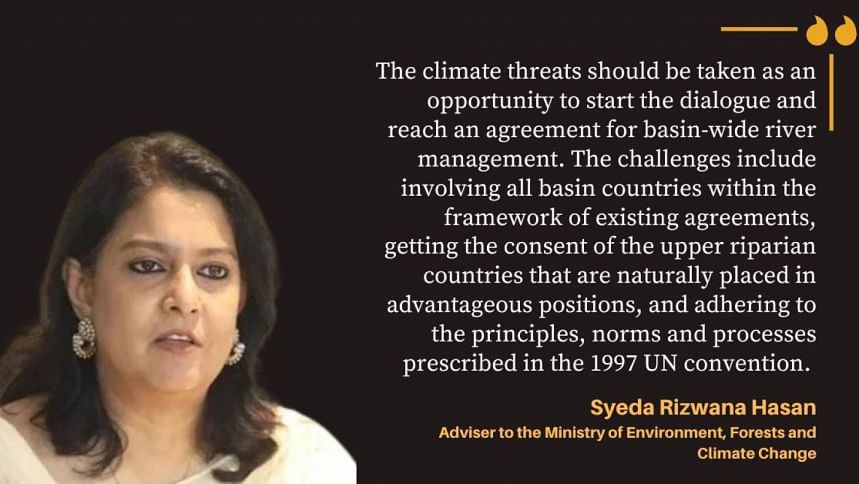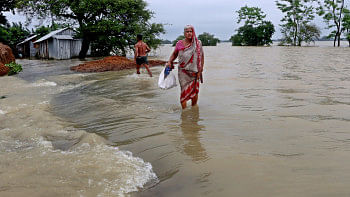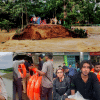In conversation with Syeda Rizwana Hasan: ‘It’s been most challenging to reach those marooned in Feni’

Syeda Rizwana Hasan, adviser to the Ministry of Environment, Forests and Climate Change, discusses the severity of the floods, challenges of rescue efforts in Feni and next steps of the interim government in addressing this unexpected national crisis in an interview with Sushmita S Preetha of The Daily Star.
Flooding has taken a dire turn in the country within a very short time. Feni, in particular, has not faced such a critical situation in living memory. What's the latest update from the ground?
We are hearing the same thing on the ground. There has been flooding in Feni before, but never to such an extent. Feni locals are not used to such terrible flash floods, neither are government and non-government authorities. Now we are hearing that water is coming into the city as well, which is a matter of great concern. The most challenging aspect has been reaching remote areas and carrying out rescue operations. On Wednesday night, there was no electricity or mobile network, so the rescue mission became very difficult. We could not restore electricity as there was the risk of electrocution. Most of the rescue operation has to be conducted during the day, so the situation really is severe in those areas.

What immediate measures are the interim government taking to help the affected communities?
There is enough relief to provide immediate support, as per government data. But the real issue, as I said before, is accessing the affected people. One of the demands coming out of the flood-affected areas has been to use helicopters to rescue those who are marooned, but we are not able to do so because the weather is still quite treacherous, so helicopters still cannot reach those areas. There is also a demand that helicopters be used to provide relief; even that is not possible at the moment because 1) there is too much water, and 2) when you drop relief from a helicopter, people rush towards it and there is a risk of loss of life, which we must avoid. Right now, we are taking urgent measures to rescue people; the Bangladesh Inland Water Transport Authority (BIWTA) is sending boats, the army is there, a lot of volunteers are working; but then again, they are faced with difficulty in accessing places where people are trapped.
Excessive rain and hillside runoff are causing the flood. But many are also speculating that the situation has worsened because a dam in India's Tripura has been opened. What is your take on this?
This is not a matter of personal opinion. It is a government-to-government matter. There has been a lot of rain, and as a result, some dams have been opened on the Indian side. What we are trying to figure out is whether we were told before the [Tripura] dam was opened. We may not have a treaty on this particular river, but there are international treaties—such as the no-harm principle, principle of cooperation—on how to manage transboundary or shared resources between countries. Our chief adviser is set to speak with the Indian prime minister and raise these concerns.
The other issue is, why do we only have agreements on eight rivers when we share so many rivers with India? The chief adviser will address what happened in this particular instance, but he will also discuss and prioritise how to prevent such things from happening in the future.
The climatic threats should be taken as an opportunity to start dialogue and reach agreement for basin wide river management. The challenges include involving all basin countries within the framework of existing agreements, getting consent of the upper riparian countries that are naturally placed in advantageous position, adhering to the principles, norms and processes prescribed in the 1997 UN Convention as none of the riparian countries is a party to it and of course putting in place an effective dispute resolution mechanism.

How is the shuffling of the local government going to affect disaster and relief management?
A local government is, of course, of tremendous help in such situations. Even though there has been a reshuffling in local government, it is not that it has collapsed. Someone from each of those local government offices has been appointed as the administrator. And during disasters, as you also know, one institution may be tasked with the primary role, but all institutions must come together and give their all. To ensure that all departments and ministries can work effectively and urgently together, the disaster management ministry, along with the ministries of fisheries and livestock, agriculture, health, etc, is taking coordinated efforts at the field level as well as the national level.
The adviser for disaster management and relief, who could not go earlier because of bad weather, went to Feni today. He may not have been able to visit the remote areas, but he will oversee the coordination from a nearby area.
Besides Feni, there are other districts such as Cumilla, Khagrachhari, etc, which have also been affected by the flash floods. What steps are you taking there?
The situation in Feni is particularly bad, so we are giving our utmost attention there. But local government agencies, ministries, and the army have all been instructed to do their due diligence in other affected areas, and they are being deployed in the places where the embankments have not broken yet, and to ensure that they are ready with whatever is necessary to tackle the situation. Every area is getting attention, but we are particularly worried about Feni because the communication system there has broken down completely.
Many have also questioned the government's poor river conservation and management initiatives amid the increasing intensity and frequency of floods in the country.
Today, we discussed in a meeting that in many areas, water is not receding because of the arbitrary way in which embankments, bridges and/or culverts have been constructed. Since this is a flash flood, when the rain lets up, the rainwater is supposed to recede quickly. There may be river erosion at that time. However, when the water recedes, there must be no obstruction. So, the bigger concern as to whether we have done adequate river management keeping in mind how flood-prone we are was discussed, though the immediate focus is now on rescue and rehabilitation. I have long been saying that our rivers are losing navigability. We have to address these wider concerns in the long run.
Follow The Daily Star Opinion on Facebook for the latest opinions, commentaries and analyses by experts and professionals. To contribute your article or letter to The Daily Star Opinion, see our guidelines for submission.

 For all latest news, follow The Daily Star's Google News channel.
For all latest news, follow The Daily Star's Google News channel. 










Comments